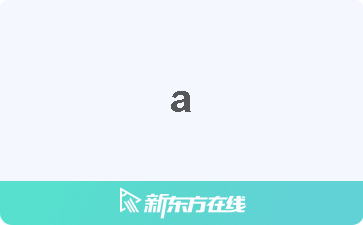a

1. (用于首次提及或泛指某人或某物)一(个)
You use a or an when you are referring to someone or something for the first time or when people may not know which particular person or thing you are talking about.
双语例句
例:A waiter entered with a tray bearing a glass and a bottle of whisky.
一名服务员端着一个放有一只玻璃杯和一瓶威士忌酒的托盘进来了。
例:He started eating an apple.
他开始吃苹果。
2. (用于指一类人或物,不需要特指)任何一(个)
You use a or an when you are referring to any person or thing of a particular type and do not want to be specific.
双语例句
例:I suggest you leave it to an expert.
我建议你把它留给专家来处理。
例:Bring a sleeping bag.
带个睡袋来。
3. 一种(用于前有形容词或后有修饰语的不可数名词前)
You use a or an in front of an uncount noun when that noun follows an adjective, or when the noun is followed by words that describe it more fully.
双语例句
例:The islanders exhibit a constant happiness with life.
这些岛民表现出一种对生活的持久的幸福感。
4. 一种(用于物质名词前,特指某物的种类或成分)
You use a or an in front of a mass noun when you want to refer to a single type or make of something.
双语例句
例:Bollinger 'RD' is a rare, highly prized wine.
Bollinger“RD”是一种罕见的、非常名贵的葡萄酒。
5. (用在量化词组中,如a lot, a little, a bit等)一......
You use a in quantifiers such as a lot, a little, and a bit.
双语例句
例:I spend a lot on expensive jewellery and clothing.
我在昂贵的首饰和衣服上开销很大。
6. (指某人或某物是一个团队、阶层或类型中典型的成员或部分)一(个)
You use a or an to refer to someone or something as a typical member of a group, class, or type.
双语例句
例:Some parents believe a boy must learn to stand up and fight like a man.
一些家长认为一个男孩必须学会像男子汉一样奋起战斗。
7. (用于某一天、某一月份或某节日前,特指在该天、该月或该节日发生的事件)一个
You use a or an in front of the names of days, months, or festivals when you are referring to one particular instance of that day, month, or festival.
双语例句
例:The interview took place on a Friday afternoon.
该面谈是在一个星期五下午进行的。
8. (用于说明某人的职业)一位 , 一个
You use a or an when you are saying what someone is or what job they have.
双语例句
例:I explained that I was an artist.
我解释说我是一位艺术家。
9. 一(代替one,尤与量词hundred, hour, metre和分数词half, quarter, third合用)
You use a or an instead of the number 'one', especially with words of measurement such as 'hundred', 'hour', and 'metre', and with fractions such as 'half', 'quarter', and 'third'.
双语例句
例:more than a thousand acres of land.
一千多英亩的土地。
10. 每一(用于速率或比率的表达中)
You use a or an in expressions such as eight hours a day to express a rate or ratio.
双语例句
例:Prices start at $13.95 a yard for printed cotton.
印花棉布开价为13.95美元一码。
DET. 限定词

关注新东方在线考雅课程中心
免费获取雅思备考资料包
雅思口语题库
扫码添加助教回复【口语题库】免费领取


 资料下载
资料下载
 公开课
公开课 编辑推荐
编辑推荐